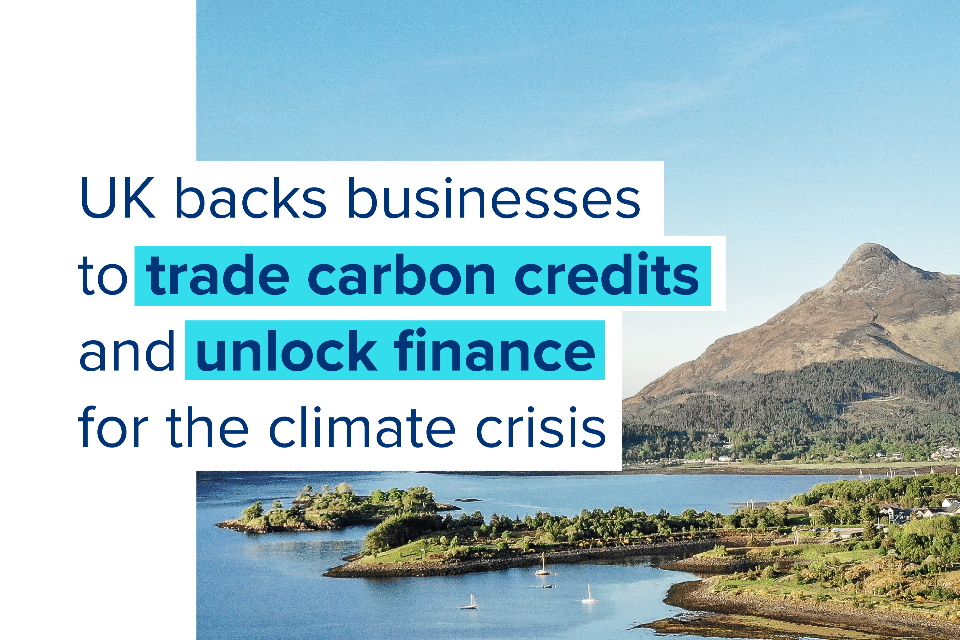- Britain is back in the business of climate leadership, leading a new growth market and cementing UK as the green finance capital of the world
- voluntary carbon and nature markets to unlock new revenue streams for UK businesses delivering on Plan for Change
- UK work will boost opportunities for businesses at home and abroad to unlock private finance for the climate crisis
British businesses and organisations will be better supported to trade carbon credits as part of new work to establish the UK as the global hub for green finance – driving growth and investment while tackling the climate crisis through the Plan for Change.
Today the government has launched plans to strengthen voluntary carbon and nature markets which can help leverage the finance needed to address the scale of the climate emergency whilst diversifying revenue streams for British businesses.
These markets support the trading of carbon credits, where a business can reduce their emissions by investing in environmentally friendly projects such as deploying electric vehicles, reducing deforestation, removing carbon dioxide through carbon dioxide or planting trees.
Currently these markets are not realising their full potential, with a lack of clarity among businesses and organisations on how they can be used, and some poor practice impacting their effectiveness in delivering meaningful climate action and economic growth. There have been widespread calls from businesses and organisations for greater clarity in how to use these markets as part of their plans to reach net zero.
In response, the UK is establishing a global framework to build trust and confidence in carbon and nature credit trading, with a set of principles to guide and support businesses on how to use carbon credits that provide environmental benefits. This includes making clear what a good credit is, ensuring they are delivering environmental benefits and encouraging businesses to fully disclose what they are being used for in annual sustainability reporting.
These markets are estimated to be worth up to $250 billion by 2050 for carbon markets, and $69 billion for nature markets, under the right conditions. By increasing confidence in these markets, British businesses – including farmers and land managers – will be well positioned to seize the economic rewards by creating new revenue streams and investment opportunities.
These plans will further strengthen the UK as the green finance capital of the world – leading the way in a new growth market, unlocking private finance for climate change and backing businesses on the clean energy transition.
Positive climate action can lead to significant growth opportunities for UK businesses with the UK seeing £43.7 billion of private investment into UK’s clean energy industries since July. Recent figures from the CBI shows that the net zero economy grew 3 times faster than the economy as a whole last year, with employment in the sector up by over 10%.
Climate Minister Kerry McCarthy said
Building up trust in carbon and nature markets is crucial to their success in driving meaningful climate action and real, lasting change for the environment.
The UK is determined to spearhead global efforts to raise integrity in these markets so they can channel the finance needed to tackle the climate crisis and speed up the global clean energy transition.
These principles will cement the UK as the global hub for green finance and carbon markets. This is an opportunity to deliver on the climate crisis and drive investment and growth in the UK as part of our Plan for Change.
Nature Minister Mary Creagh said
Nature underpins everything. Voluntary carbon and nature markets will be an important tool to crowd in private finance to protect our precious peatlands, important habitats and rare species.
It is why increasing trust in these markets will ensure that they benefit both people and our planet, ensuring money flows towards genuine environmental improvement projects and creates new sources of finance for farmers and land managers in the UK.
Carbon credits are tradable units that represent the reduction or removal of greenhouse gases emissions from the atmosphere. One credit typically represents one metric tonne of CO2 or its equivalent. Companies or individuals purchase these credits from project developers who have generated them through activities like reforestation, cleaner energy, or other emission reduction projects. By buying the credits, they are financing projects that would not otherwise happen, in addition to steps that they are taking to reduce their own emissions.
Mark Kenber, Executive Director, Voluntary Carbon Markets Integrity Initiative (VCMI) said
Businesses need clarity and confidence to invest in voluntary carbon and nature markets that help meet global climate goals. This consultation from the UK government plays a vital role in delivering this.
VCMI welcomes the proposal to recognise our Claims Code as international best practice, as well as the global leadership shown by the UK’s proposal to incentivise greater action by companies to address their unabated Scope 3 emissions through the inclusion of our forthcoming Scope 3 Action Code of Practice. The Code of Practice will enable companies to go further, faster and with integrity on climate action.
The proposals in the consultation align with the UK government’s new approach to ensure regulation supports growth. The consultation explores the recommendation in the recently published Corry Review to launch a Nature Market Accelerator to bring coherence to nature markets and accelerate investment.
The consultation will be live for 12 weeks, seeking responses from industry organisations and the public
Voluntary carbon and nature markets raising integrity
Onel Masardule, Co-Chair, Indigenous Peoples and Local Communities Engagement Forum, Integrity Council for the Voluntary Carbon Market (ICVCM) said
For the voluntary carbon market to succeed, it must respect the rights and interests of Indigenous Peoples and local communities, and make us true partners – rather than just stakeholders – in the market. ICVCM’s The Core Carbon Principles (CCPs) define what high integrity carbon credits should look like ensuring that new carbon projects have robust social and environmental safeguards, operate with the free, prior and informed consent and are transparent about how they share benefits. I welcome the UK government’s proposal to endorse the use of CCP-labelled credits and encourage other governments to do the same. This will provide clarity on what high integrity means to enable the market to scale to accelerate climate action and deliver positive environmental and social outcomes at the local level.
Notes to editors
The 6 integrity principles being consulted on are
- suppliers should ensure credits meet recognised high integrity criteria that ensure credits deliver environmental benefits
- buyers should measure and disclose the planned use of credits as part of sustainability reporting
- users should consider how credits feed into wider transition plans that align with the 1.5°C goal of the Paris Agreement
- claims involving the use of credits should accurately communicate an organisation or product’s overall environmental impact, including by using appropriate and accurate terminology
- market participants should cooperate with others to support the growth of high integrity markets
- credits should only be used in addition to ambitious climate action within value chains







